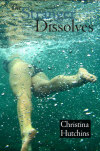The Stranger Dissolves
In Christina Hutchins’ first full-length book, the speaker contemplates the development of the self within the body’s dissolution over a lifetime. Less abstractly, the poet-speaker interweaves meditations of aging within familiar surroundings which are themselves growing older, of slowly losing her father to Alzheimer’s while simultaneously finding renewal in her ripening love for her girlfriend. In the face of her life’s constant material change, she often sees a moment’s “beauty…in the distortion,” and she hears in the “small silences between waves” “the black hole in me.” And faced with the certainty of her loss, the speaker desires the clarifying sort of beauty found only within the quiet:
In Christina Hutchins’ first full-length book, the speaker contemplates the development of the self within the body’s dissolution over a lifetime. Less abstractly, the poet-speaker interweaves meditations of aging within familiar surroundings which are themselves growing older, of slowly losing her father to Alzheimer’s while simultaneously finding renewal in her ripening love for her girlfriend. In the face of her life’s constant material change, she often sees a moment’s “beauty…in the distortion,” and she hears in the “small silences between waves” “the black hole in me.” And faced with the certainty of her loss, the speaker desires the clarifying sort of beauty found only within the quiet:
days when the sun
rattles the seedpod
and nothing happens
but a shadow
swallowed by other shadows.
Throughout this consistently strong collection, Hutchins’s poems fill the imagined field with considerable feeling and intuition, rendering it alive with the lyric hum of her carefully crafted lines.
“I am leaving soon,” she writes in “The Physicist to His Daughter,” “Slipping to where language / will no longer find me.” Here the speaker imagines her father reassuring her of his love, even as he slips further and further away: “Know that I do not want to forget / your name. I am your father. / I held your small, untamed hand. // When I have forgotten, remember / who I am: expand the universe.” Two poems later (in “A Woman’s Desperate Hands”), the speaker walks along on a windy day, thinking of her lover, and her melancholy mood is blown over to pangs of longing and tenderness: “Walking home, I missed you, / that quick ache, white glint / of the sidewalk.” And when the speaker notices “a woman’s desperate hands / opened against” a police car’s “thick glass,” the focus of the poem shifts, as if taken by a gust of wind, toward a Whitman-like social awareness. Reading the desperation in the arrested woman’s face, the speaker sends kind thoughts her way: “It’s all right. The air will move again.”
Hutchins’s poems are most resonant when they expand a small, concrete situation or image into increasingly larger psychological or ontological contexts. Consider “Hail,” in which the speaker describes herself collecting pieces of fallen hail and “wanting to stow them, / to show them off,” but then realizing “the dust knows better.” A biochemist, minister and professor of philosophy as well as a poet, Hutchins positions her speaker as a person who not only utilizes these roles to make meaning, but also as one who embodies them in good faith:
Is this where my father lives?
Inside the melting I looked down
the vortex of his eyes and saw the greatest human sadness:
the porch door I couldn’t open, though there was a day,
waves, such a blue lake, the air’s restless fingers.
What does it mean to lose the world by increments?
It is rendered in the stitch by stitch diction of a ripping seam.
In empty pockets of dust along the road, where melting
stones have cratered earth like its moon.
Here Hutchins finds a way, as she does throughout the book, to register her reality by correlating her speaker’s complex emotional interior with resounding external imagery. Specifically, she effectively inverts the vast into the minute: “the vortex of his eyes”; and she draws parallel images between macro- and microcosmic phenomena: “empty pockets of dust” made by hailstones mirror the “cratered” moon. And she infuses the sensory details of the present with memory, allowing the reader to consider past and present events asynchronously, which mimics the flow of consciousness.





